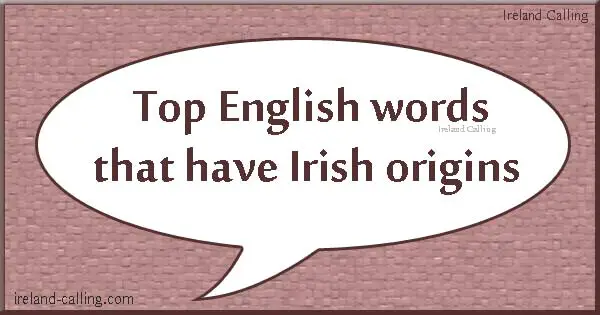While English may be the most used language in the western world, it has borrowed from many other languages over the centuries such as French, German… and Irish.

In fact, some of the most colourful words in the English language originated across the water in Ireland, or at least have Irish connections. Here are some of our favourites.
Boycott is a word we use today when we urge people not to buy products from a company that has resorted to unethical business practices. It comes from Co Mayo in Ireland in the 19th century. Captain Charles C. Boycott was a British land agent who refused to reduce his rents following campaigns by the Irish Land League.
On the advice of Charles Stewart Parnell, rather than resort to violence, the people in his community simply ostracised Boycott and refused to have anything to do with him. The word boycott then entered the language, meaning to shun and ignore.
Brogue/brogues are words that come from the Irish word ‘bróg’ which means ‘shoe’. A brogue is still a type of shoe but the word also has another meaning. It can also refer to a person with an accent – particularly Irish or Scottish. A person could be described as having a warm Irish brogue or a strong Scottish brogue.
It is possible that the word developed when people met others from different regions, they may have worn distinctive shoes and also spoken with different accents.
Callow is a word to describe a person who is not yet fully mature and lacks experience of life. It’s often used in phrases such as ‘callow youth’. It comes from the Gaelic word ‘calac’ which meant ‘bald’. It is unclear why the meaning changed to such an extent, perhaps it was originally used ironically, or it may have referred to a youth not yet growing a beard.
Glen is a word for a valley. It comes from the Gaelic word ‘gleann’ There are hills all over Ireland and England and therefore many valleys, or glens. Glen often refers to a U shaped valley that was created by a glacier.
Gob is an informal word for mouth used as slang by the English often in a slightly negative tone – ie ‘He never shuts his gob’ meaning ‘he talks too much’ or ‘he’s always filling his gob’ meaning ‘he eats too much’. It was originally an Irish word that meant ‘beak’, although it was more often used to describe a person with a ‘beaky’ nose than a bird’s beak.
Hooligan is an English word to describe someone who is a violent troublemaker. It comes from the Irish surname Houlihan. In the 1890s and through to the turn of the century, Irishman Patrick Hoolihan and his family ran riot in London to such an extent that their name became synonymous with disruptive and thuggish behaviour.
Kibosh means to stop or bring an end to something. It has been used in England since the 19th century. While some believe the word has Turkish or Hebrew origins, it is just as likely to have come from the Gaelic chaip bháis- which means ‘cap of death’. The cap of death was a black cap worn by an executioner.
Loch is the Gaelic word for lake. While Britain is full of lakes, many are titled using the Gaelic word – most famously Loch Ness in Scotland. There are lochs all over Ireland including Glendalough which means ‘Glen with two lakes’.

Phony is a word that can be used to describe a product or a person as being fake, insincere or counterfeit. It has been used in this way in England since the 1800s. It is thought to have come from the Irish word fáinne – which means ring. A ‘fawney rig’ was a rigged game, or con trick, in which a person would be bamboozled into buying a ring for up to 10 times its value.
Slob is a word to describe someone who is lazy and unhealthy. It has been used in this way in England since the mid-19th century. Before then, slob meant ‘muddy or marshy land’. It came from the Irish word ‘slaba’ which meant ‘ooze’ or ‘slime’.
Slogan comes from the Irish word ‘sluagh-ghairm’ which was used to describe the battle cry of the ancient Irish clans. In English is has come to be associated with an organisation’s marketing and identity. While a logo can visually represent a company, a slogan can put its message into words.
Smithereens is a word to describe the tiny pieces that are left of an object once it has been broken. A plate can be ‘smashed to smithereens’ if it is dropped on the floor. It has been used in English since the 1800s. It comes from the Irish word smidirín – which means a fragment or shard. Smidirín has its opposite word – smiodar, which is the larger object.
…and one ‘Irish’ word that is actually English
It’s hard to believe, but that most Irish of words, – craic – actually originated in England. We all know the Irish phrase ‘enjoy the craic’ which refers to having a laugh and a joke, and generally having a good time.
However, the word dates back to the Middle Ages where it originated in northern England. Back then, the word ‘crack’ referred to a talkative and boastful person. The word was taken up by the Irish in the mid-20th century and the spelling changed to ‘craic’. The meaning changed slightly over the years to simply refer to fun and enjoyment.
The word went back to England as recently as the 1970s with its updated Irish meaning, and is very much thought of as an Irish word. The word, with the new Irish meaning, is now used far more in England than it ever was before it came to Ireland.
23 common Irish phrases that confuse overseas friends and family
